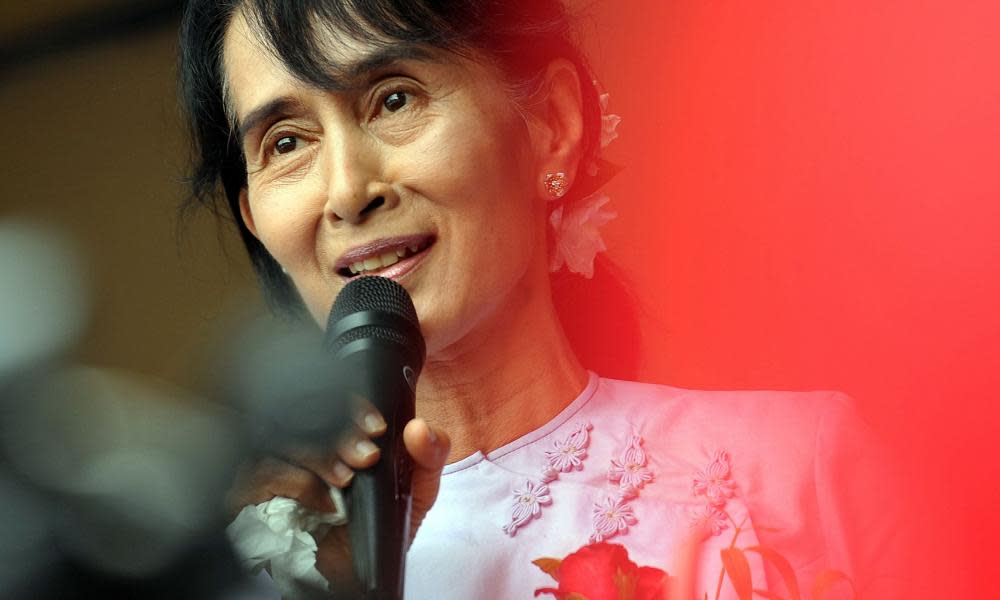Myanmar’s junta condemned over guilty verdicts in Aung San Suu Kyi trial

First verdicts announced in cases against Myanmar’s former leader, who was deposed in a coup in February
A military court in Myanmar has found Aung San Suu Kyi guilty of incitement and breaking Covid restrictions, drawing condemnation from the United Nations, European Union and others, who described the verdicts as politically motivated.
The 76-year-old, who was deposed in a coup in February, is set to serve two years in detention at an undisclosed location, a sentence reduced from four years after a partial pardon from the country’s military chief, state TV reported.
The court in the capital Naypyidaw was delivering its first verdicts in numerous cases brought against Aung San Suu Kyi that have previously been described by her lawyer as absurd.
“The conviction of the state counsellor following a sham trial in secretive proceedings before a military-controlled court is nothing but politically motivated,” UN human rights chief, Michelle Bachelet, said.
The EU’s top diplomat also condemned the verdict as politically motivated and called for the immediate release of all political prisoners in Myanmar. Liz Truss, the foreign minister of former colonial power Britain, said the sentencing was “another appalling attempt by Myanmar’s military regime to stifle opposition and suppress freedom and democracy”.
Little is known about the proceedings in any of the legal cases. Aung San Suu Kyi has been tried in a closed court, with no access for observers, and her lawyer has been prevented from speaking to journalists.
Aung San Suu Kyi has been held at an unknown location since February.
The incitement case reportedly centred on a statement, published online following the February coup, which had urged international organisations not to cooperate with the junta. The second case alleged that she had broken Covid rules while campaigning before last year’s election.
The former president Win Myint was sentenced to four years on the same charges. Myo Aung, the former mayor of Naypyidaw, was sentenced to two years for incitement.
Charles Santiago, the chair of the group Asean Parliamentarians for Human Rights, said Monday’s ruling was “a travesty of justice” that demonstrated the junta’s contempt for regional efforts to find a resolution to the country’s crisis.
“No one is fooled by today’s sentencing,” he said in a statement. “Since the day of the coup, it’s been clear that the charges against Aung San Suu Kyi, and the dozens of other detained MPs, have been nothing more than an excuse by the junta to justify their illegal power grab.”
Analysts have described the charges against the ousted leader, which have continued to grow in number since February, as a transparent attempt to remove her as a political threat. Her National League for Democracy party won a thumping victory in last year’s election but the military refused to accept the result.
Aung San Suu Kyi, who previously spent a total of 15 years in detention campaigning against the military, could be held by the junta for the rest of her life if found guilty on all charges.
Ming Yu Hah, Amnesty International’s deputy regional director for campaigns, said the sentences were “the latest example of the military’s determination to eliminate all opposition and suffocate freedoms in Myanmar”.
According to the Assistance Association for Political Prisoners, she is one of more than 10,600 people to have been arrested by the junta since February, as it has sought to crush any form of opposition. At least 1,303 have been killed.
“As violence escalates, displacing tens of thousands of people and setting up a humanitarian crisis in the middle of an ongoing pandemic, the situation in Myanmar today is alarming in the extreme. Without a decisive, unified and swift international response this can and will get worse,” said Ming Yu Hah.
Almost one year on since the coup, the military has struggled to impose order. The economy is failing, health and education systems have collapsed, poverty rates have soared and conflict has escalated. Last month, the Special Advisory Council for Myanmar, which includes experts such as Yanghee Lee, the former UN special rapporteur on human rights in Myanmar, warned military offences were cutting off communities’ food and medical supplies, forcing people to the brink of starvation.
The junta faces both a peaceful resistance movement and an armed opposition formed of people’s defence forces allied with various ethnic armed groups. In September, the National Unity Government, a shadow government formed by elected officials, declared a “defensive war” against the junta, calling for civilian armed groups to target the military and its assets.
Joshua Kurlantzick, senior fellow for south-east Asia at the Council on Foreign Relations, said that the NUG, which is seeking international recognition, is making headway in securing major meetings with officials internationally. “The continued success of the people’s defence forces may also have some impact on how other governments view the situation in Myanmar,” he said, in comments given prior to Monday’s verdict.
A special envoy from the Association of Southeast Asian Nations, which has led diplomatic efforts to solve the crisis, has been refused permission to meet Aung San Suu Kyi. In response, the bloc took the unusually tough step of barring the junta chief from its meetings.
Richard Horsey, the International Crisis Group’s senior adviser on Myanmar, said that despite such action, Asean appeared to lack the leverage to force the junta to change course. While other countries have supported the Asean approach “this has been mostly a way of outsourcing the problem to Asean rather than any conviction that the regional bloc could make progress”, he added, in comments prior to Monday’s sentencing.
“Myanmar needs to be a much higher diplomatic priority for the major powers and the UN.”

 Yahoo Movies
Yahoo Movies 
